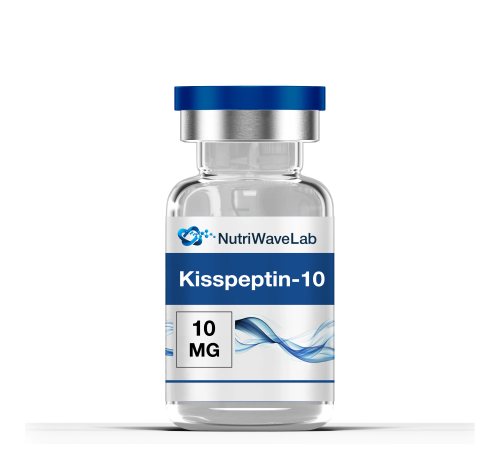
Kisspeptin-10 is a synthetic peptide that mimics the naturally occurring kisspeptin protein, which plays a crucial role in reproductive health and hormone regulation. This peptide activates GnRH neurons, influencing the release of two key reproductive hormones: Follicle Stimulating Hormone (FSH) and Luteinizing Hormone (LH). Kisspeptin-10 has been shown to increase testosterone, stimulate sexual arousal, improve mood, and support fertility in both men and women. Additionally, it may help prevent the spread of cancer, regulate kidney function, and promote new blood vessel growth. Kisspeptin-10 is considered a promising treatment for reproductive and sexual health disorders.
What is Kisspeptin-10?
Kisspeptin-10 is a significant peptide that regulates the human reproductive system. It plays a crucial role in stimulating the release of gonadotropin in both men and women, increasing testosterone levels and the frequency of luteinizing hormone (LH) pulses in men. In addition to its reproductive function, Kisspeptin-10 also impacts metabolism and appetite control by influencing neurotransmitters in the brain. Moreover, it may affect collagen content in the heart.
Kisspeptin-10 and Testosterone Levels
Research shows that Kisspeptin-10 significantly impacts testosterone levels in men:
A 2011 study revealed that bolus injections
of Kisspeptin-10 strongly stimulate LH secretion in men, and continuous
infusion increases testosterone levels, LH pulse frequency, and pulse size [R].
In men with type 2 diabetes and central
hypogonadism, Kisspeptin-10 was found to enhance endogenous testosterone
secretion [R].
Another study demonstrated that
Kisspeptin-10 stimulates gonadotropin release in men but not in women [R].
Kisspeptin-10 and Reproductive Health
Kisspeptin-10 stimulates the release of
gonadotropin, a hormone essential for reproductive health in men. In women, its
effects are more nuanced: it stimulates gonadotropin during the pre-ovulatory
phase of the menstrual cycle, but not during other phases. This indicates
sexual dimorphism in the response to Kisspeptin-10 [R].
Kisspeptin-10 may also serve as a potential therapeutic agent for treating reproductive disorders. For instance, a variant of the peptide, Kisspeptin-54, has been successfully used to induce oocyte maturation in women undergoing in vitro fertilization (IVF) treatment [R].
Kisspeptin-10 and Sexual Arousal
A 2023 study found that Kisspeptin-10
improves sexual mood and promotes penile tumescence in men with hypoactive
sexual desire disorder (HSDD) [R].
In women, Kisspeptin-10 modulated brain activity related to sexual perception, helping to reduce sexual aversion [R].
Kisspeptin-10 and Metabolism
A 2018 study discovered that Kisspeptin-10
could influence the expression of neuropeptide Y (NPY), a key regulator of
appetite, as well as serotonin and dopamine levels, both of which play a role
in appetite control [R].
Additionally, a 2020 study showed that Kisspeptin-10 affects the brain's response to visual food stimuli, potentially influencing appetite and eating behavior [R].
Kisspeptin-10 and Cancer Research
Research from 2018 demonstrated that
Kisspeptin signaling can suppress cancer cell metastasis by inhibiting their
proliferation, migration, and invasion [R].
In studies on breast cancer cell lines, Kisspeptin-10 was shown to inhibit cancer cell migration by regulating the epithelial-mesenchymal transition process [R].
Kisspeptin-10 and Heart Disease
A 2017 study found that Kisspeptin-10 may
affect serum metabolism and cardiac muscle, indicating potential for its use in
cardiovascular disease therapy [R].
A 2023 study revealed that Kisspeptin-10
increases collagen content in the myocardium, which could impact the progression
of heart disease

Molecular Formula:
C₆₃H₈₃N₁₇O₁₄
Molecular Weight:
1302.4 g/mol
PubChem CID:
25240297
Synonyms:
- Kisspeptin-10
- 374675-21-5
- Kisspeptin-10 (human)
- Metastin (45-54)
- KP-10
Research Applications:
- Testosterone
- Reproductive Health
- Sexual Arousal
- Metabolism
- Appetite Control
- Cancer Research
- Heart Disease
Product Use: THIS PRODUCT IS STRICTLY FOR
SCIENTIFIC RESEARCH PURPOSES ONLY. It should only be used in laboratory
settings. All product information on this website is provided solely for
educational purposes. The law strictly prohibits introducing this product into
the body of humans or animals. Only licensed professionals should handle this
product. This product is not a drug, food, or cosmetic and should not be
improperly classified or used as such.
There are no reviews for this product.
No questions about this product.
